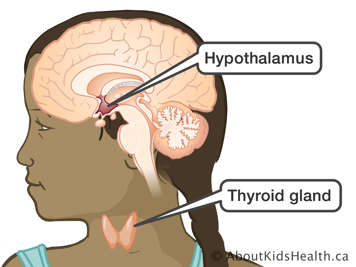
Your child’s weight will be monitored as part of overall health monitoring during clinic visits. It is important to remember that a healthy weight is different for every child. There are some general guidelines to follow for maintaining a healthy weight such as following a healthy diet and getting regular physical activity. However, further measures may need to be taken in some cases.
What can be done about weight gain?
Several factors can affect weight gain in children with brain tumours.
- High dose steroid use: Some of the weight gained is caused by water retention, which will be lost when steroid use is stopped. Replacement doses of steroid does not lead to weight gain.
- The treatment or type of tumour: Children with a tumour located near the hypothalamus may develop an uncontrollable appetite or hunger. The hypothalamus is a part of the brain that controls eating and appetite. The tumour itself or the surgery to remove the tumour may damage the hypothalamus. The result is that a child may feel very hungry and eat a lot.
- Untreated or undiagnosed hypothyroidism: Low levels of thyroid hormones cause the body’s metabolism to slow down.
For weight gain caused by uncontrollable hunger, certain strategies may be recommended by the health-care team. A small number of children may need help from a dietitian or behaviour specialist.
How will excessive weight gain affect your child’s future?
If it is not managed, obesity can lead to other health problems. These include:
- increased risk of developing high blood pressure
- type 2 diabetes
- heart attacks
- stroke
- various cancers
- arthritis
- back pain
However, even a small amount of weight loss can reduce these risks.
How can you help your child?
Below are strategies to encourage your child to be active and reduce screen-time:
- Try to be active every season of the year.
- Choose different activities you enjoy and encourage physical activities of daily living (e.g., taking the stairs instead of the elevator, walking instead of driving).
- Limit TV and computer time.
- Avoid eating in front of the TV.
Help your child to establish healthy eating patterns
- Eat 3 meals a day. Include protein with each meal to help reduce hunger. Do not skip meals, especially breakfast.
- If you are hungry between meals, eat healthy snacks.
- Eat slowly.
- See Canada’s Food Guide for Healthy Eating.
- Water is the preferred beverage when your child is thirsty. Avoid pop or juice as they provide empty calories.
- Eat at home more often.
- Limit intake of take-out or fast food.
